By Terri Goldberg
According to the US EPA, in 2017, the latest year for which they have published data, the United States recycling and composting rate was about 35%. The country’s recycling rate has been stuck in the low- to mid-30 percent range since the early 2000s in spite of the extensive efforts to improve it.
In part, the recycling system has been working to keep up with the changes in the materials generated by households, businesses, and institutions. Over the past decade, the composition of municipal solid waste has been evolving away from newsprint, office paper, and glass containers and toward more plastic and aluminum packaging and corrugated cardboard. At the same time, the trend toward lighter-weight aluminum, steel, and plastic containers to reduce raw material usage and shipping costs is decreasing the total weight of the waste stream. Packaging innovations have produced lightweight, multilayer packaging, multi-resin pouches, and more products in shelf-stable aseptic cartons (e.g., beverages and soups). The changing waste stream means Materials Recovery Facilities (MRFs) are processing bulkier and lighter materials, which leads to higher operating costs.
Like all commodities, recyclables have always been subject to market fluctuations. For a few decades, China has been a key market for mixed paper and mixed plastic recyclables collected in residential recycling programs like Belmont’s. The Chinese government’s recent policies, which impose strict standards on the imports of recyclable commodities, are having a dramatic impact on recycling across the United States.
Chinese policy now bans the import of mixed paper and plastic unless they meet virtually unachievable contamination limits. The recycling industry has been forced to find alternative markets for the materials China will no longer accept. In addition, much of the plastic material has either no value or is too difficult to recycle, making some scrap plastic nonrecyclable. Flooded domestic markets have led to lower prices and increased costs to process recyclables to higher quality standards.
For packaging and paper products, the impact of the market value decline has not (with the exception of glass) generally been met with eliminating these materials from recycling programs, but program costs have increased. Certain types of plastic packaging and aluminum cans are currently the highest-value materials recycled in residential recycling programs. However, mixed paper, which constitutes the majority by both weight and volume of residential recycling programs, has dramatically declined in value. In many instances, MRFs have to pay to recycle these materials.
Apart from the market value concerns, there is a true need to collect more material to reduce the tonnage going to landfills in the State and exported to disposal facilities in other states, especially plastic food and beverage containers and heavier household plastics, such as detergent bottles. Many large brands have made commitments to make their products more recyclable and increase recycled plastic content in their packaging and to make their packaging recyclable, reusable, or compostable in recent years , which should help to improve the market conditions for these recyclables.
Spotlight: Recycling Prices in Massachusetts
By Meg Muckenhoupt
Recycling has gotten a lot more expensive in Massachusetts in the last three years. According to reports by the Boston Globe and WGBH earlier this year, Boston’s cost of collecting and carting recyclables has surged from $200,000 in 2017 to $5 million for the 2020 fiscal year, with processing costs increasing from $5 to $140 per ton.
The reason? Other countries have stopped accepting recyclable waste. In 2017, China declared it would no longer be the “world’s garbage dump,” and banned imports of 24 types of solid waste, including unsorted paper and plastic bottles. In 2019, Indonesia announced strict limits on contamination in recycling paper—a move which reduced US paper exports to that country by 95%. In January 2020, India stopped all imports of mixed paper. India’s new policy was especially disastrous for American recycling exporters because they had come to rely on India’s market after China closed its ports to paper; at the time of the ban, 40% of North American paper recycling exports were shipped to India.
Before China’s import ban, Waste Management, which collects Belmont’s recycling, earned as much as $80 a ton for paper it collected. As of January 2020, that paper was worthless, and glass was selling for less than the cost of recycling it, according to the Globe.
Massachusetts’ consumers bad habits don’t make it easy to export paper either. In 2019, WBUR reported that about 25% of the material collected from single-stream recycling bins by Casella Waste Systems, which runs a municipal recovery facility that processes recycling in Charlestown, was contaminated with food or other waste, or wasn’t even recyclable. Massachusetts municipal recovery facilities are designed to reduce contamination rates from 25% to 3%—but China will not accept paper loads with more than 0.5% contaminated material.
China’s restrictions and the associated rise in recycling costs have inspired Massachusetts and many other states to educate residents about what is and what is not recyclable, in order to decrease contamination and thus increase the value of what is collected. The Massachusetts Department of Environmental Protection has developed a Recycle Smart Campaign to help people understand how to recycle properly.
Plastic bags are the top cause of ruined recyclables. The most common contaminant in the recycling stream is any film plastic—single-use plastic bags, plastic dry cleaner bags, plastic wrap, and other stretchable plastics, according to the Recycle Smart website. These materials cannot be recycled along with paper, cans, and bottles at the curb. Plastic film gets caught in the machinery at the MRFs, causing work stoppage and worker injuries. If residents mistakenly bag recyclables in a plastic bag, all of the recyclables in it are treated as trash.
The good news is that plastic bags and wrap are collected at many grocery stores, including the Star Market in Belmont. Bring your plastic bags and put them in the labeled recycling bin— but check with the store to see if recycling has been halted due to COVID-19 concerns.
Spotlight: Belmont’s Recycling Contracts
By Meg Muckenhoupt
In February 2018, Belmont’s recycling hauler, F W Russell & Sons Disposal, gave the town an ultimatum: either start paying for the cost of collecting recyclables, or suffer “either disruption in service or litigation.” Thanks to China’s 2017 ban on most recycling imports, costs had shot up, turning recycling from a cash cow to a losing proposition.
With no obvious alternatives, and just a few months left on the contract, Belmont’s Select Board voted to pay half the cost of recycling collection, up to $45 a ton. At the time, Jay Marcotte, Belmont’s director of Public Works, estimated that the new agreement would cost the town $24,000.
Between FY2017 and FY2019, the cost of collecting and disposing of Belmont’s recycling jumped from $404,664 to $741,850, according to the Belmont Fiscal Year 2020 Town Administrator’s Budget Recommendation. For 2019, that was roughly 25% of the budget for Belmont’s Department of Public Works.
Belmont has separate contracts for hauling waste and recycling and disposing of waste. Belmont signed a five-year contract with Waste Management in 2018 that will run through June 30, 2023, to haul recycling, at a cost rising to $822,602 in 2023. Belmont’s solid waste is collected by Waste Management, then processed by Wheelabrow Technologies, a “waste-to-energy firm” which incinerates trash. In 2019, the Select Board voted to extend Wheelabrow’s contract through fiscal year 2025.
A Sustainable Belmont meeting in March, 2020, had a lively discussion about the state of the town’s recycling program, and what can and cannot be put into the relatively new single-stream recycling carts. One of the participants brought a bag filled mostly with packaging items, much of which cannot be recycled, to raise questions about why certain items can’t be recycled.
Meeting participants expressed confusion about what can be recycled and where, particularly plastics. It’s not true that a chasing-arrow symbol on a plastic container or packaging means it can be put in the recycling cart on the curb. Nor are the numbers on plastics sufficient to indicate whether an item can typically be recycled in a curbside recycling program. The Recycle Smart Campaign advises us to think more about the shape of the plastics than their numbers. Clean and empty plastic bottles, jars, jugs, or tubs are what the recycling programs accept, besides glass and paper. If in doubt, put the item in the trash.
What belongs in your bin and what doesn’t? The searchable online Smart Recycling Guide lists items accepted for recycling in every Massachusetts community. If it’s not on the list, look at the Recyclopedia guide for separate drop-off locations. The top of the Belmont recycling carts that were distributed to every household also have a quick guide to what is acceptable in the cart.
It’s important to make sure to keep recyclables clean and free of food and liquids. Rinse containers to remove food and drink residue. A little pizza grease on the box is okay, but pizza slices are not recyclable.
If you are still confused about what to put in your recycling cart, check out the town’s recycling website.
Every Day is Earth Day Now
By Meg Muckenhoupt
Unfortunately, the Belmont Citizens Forum’s annual Lone Tree Hill cleanup was cancelled due to coronavirus concerns —but you can still help clear up trash from Belmont’s open space. When you walk through the Mill Street parking lot, or along Pleasant Street, take one of the non-reuable shopping bags that grocery stores are compelled to distribute nowadays, and pick up some trash. Use some of the time you’re spending walking in Belmont’s conservation land to make a difference.
Extended Producer Responsibility
The Sustainable Belmont meeting participants discussed some new policy directions designed to assist towns, like Belmont, with improving recycling. One of the most effective, Extended Producer Responsibility (EPR), describes laws that mandate responsibilities for manufacturers/brand owners for the end-of-life management of their products, including:
- Shifts end-of-life financial and sometimes physical responsibility upstream to the producers and away from the public sector
- Provides incentives to producers to incorporate environmental considerations into the design of their products and packaging
Under an EPR system, consumers purchase products from brand owners, and these entities finance collection, recycling, and, if not recyclable, management of their products. There are different models for implementing and funding such a program, but a common strategy in Canada, Europe, and parts of Asia is the use of an intermediate Producer Responsibility Organization. The Producer Responsibility Organization develops a plan for running the EPR system, including collection, recycling, education, management of the materials, and any other mandated activities and, upon approval by government authorities, implements it.
At least 25 EPR laws have been enacted in the northeast US, covering products such as mattresses, paint, pharmaceuticals, mercury-containing products, electronics, batteries, and others. Connecticut, Maine, New York, Vermont, and Rhode Island have been leaders in enacting and implementing these programs. While plenty of bills have been introduced in Massachusetts, our state remains way behind our neighbors. The one major EPR program in Massachusetts addresses collection of pharmaceutical waste; you may conveniently drop off used medicine bottles in a bin at the Trapelo Road CVS.
Many European Union countries and at least five of Canada’s provinces manage packaging through EPR programs, with its many benefits, including:
- Dedicated non-taxpayer funding from the manufacturers and brands to sustainably support recovery, recycling, and disposal,
- An opportunity for increasing recycling and the use of recycled content,
- Relief for taxpayers who are now burdened with the high costs of recycling and disposal,
- A more consistent and predictable system that enables states and regions to take a more unified approach to strategic planning around recycling,
- Increased investment by the manufacturers and brands in end markets and recycling infrastructure.
Under the traditional Massachusetts waste management system, brand owners/manufacturers sell products to consumers but have no responsibility for recovering or recycling products or packaging. In most areas, taxpayers bear the burden for managing waste, including the cost of recycling, regardless of how much manufacturers produce. That would change if EPR were implemented in the state.
The following are some of the EPR bills before the Massachusetts legislature:
Electronics: malegislature.gov/Bills/191/S518 and malegislature.gov/Bills/191/H797
Packaging: malegislature.gov/Bills/191/H745/ and malegislature.gov/Bills/191/H750
Paint: malegislature.gov/Bills/191/H796
Mattresses: malegislature.gov/Bills/191/S2388
Contact your state legislator if you want to discuss any of these proposals with them. For more information on EPR, check out the Product Stewardship Institute and MassRecycle’s Product Stewardship Council .
Commonly Asked Questions About Recycling
Can I put black plastic items or Styrofoam in the recycling cart?
According to RecycleSmartMA.org, black plastic cannot be seen on the black conveyor belts by the optical sorters at the MRFs, so black-colored plastics do not get captured for recycling. If the black container has a clear plastic lid, rinse the lid and put it in the recycling cart without the black plastic part. Black plastic containers should reused or disposed of in the trash.
Polystyrene and Styrofoam containers or packaging should never be put in the recycling cart even if they have a chasing arrow symbol.
As a rule, all unmarked plastic materials should be put in the trash.
What about the lids on jars and containers?
Lids can be confusing. There are so many shapes and sizes and different materials.
Plastic jar lids should be placed back on the plastic jar and put in the recycling bin.
Loose lids (smaller than a credit card) are too small to be recovered at the recycling sorting facility. They fall through the cracks and are disposed of as trash. If you do not have a jar to put it on, put it in the trash.
Metal lids on glass jars should follow the same directions as those on plastic containers: replace the lid on the jar and put it in the recycle bin.
For food cans, rinse the container and put it and the lid in the recycling bin. Coffee cup lids are trash no matter what color or whether they have a chasing arrow symbol.
Which types of plastic bags are accepted at the drop-off location at Star Market?
Film plastic manufacturers through the American Chemistry Council created a public awareness initiative, the Wrap Recycling Action Program (WRAP), designed to encourage plastic film recycling. Plastic film—also known as plastic film packaging—is soft, flexible polyethylene packaging, including grocery, bread, zip-top, and dry-cleaning bags. It’s also the wrap around many products, including paper plates and napkins, bathroom tissue, diapers, and more. To recycle plastic film, first make sure that it is clean (i.e., no food residue) and dry.
The nearest drop off locations are Shaw’s, including Belmont’s Star Market, and Whole Foods. To find other nearby drop off locations, check the WRAP website. However, as off press time, many sites are not accepting plastic bags for recycling due to coronavirus concerns. Call the store before you go.
According to WRAP, plastic film can be used to make composite lumber for making decks, benches, and playground sets. Plastic film can also be reprocessed into small pellets, which can be made into new bags, pallets, containers, crates, and pipes.
Thanks to the COVID-19 pandemic, though, many stores have stopped accepting used plastic bags for recycling due to concerns about spreading disease. Call your store before you go. The COVID-19 pandemic is having widespread impacts on recycling. For example, the bottle redemption program (commonly called the bottle bill program) has been suspended in Massachusetts. To track these impacts, visit Wastedive.com’s disruption tracker.
What about putting cartons in the recycling cart?
Cartons are defined as milk, juice, or soup containers. According to the Recycle Smart website, most of the MRFs in Massachusetts, including the one servicing Belmont, no longer accept such cartons. Paper ice-cream containers and water boxes are also trash. Paper and plastic egg cartons can be collected for recycling in your recycling cart.
However, according to the Belmont Department of Public Works (DPW) webpage, “beverage cartons, spiral cans, and aseptic boxes (i.e., juice, broth cartons) of any size should be rinsed, flattened, and included in your recycling cart with other materials. Milk cartons with plastic pour spouts are acceptable.” Because of this conflicting advice, there remains confusion about these materials. Follow the town’s instructions until they change.
Where can I take textiles and other items that can’t be put in the recycling cart in Belmont?
Check out the Beyond the Bin Recycling Directory that provides searchable results for where to send materials for reuse and recycling that cannot be collected in your recycling cart.
What’s the status of the recycling program in Belmont?
For years, the Belmont DPW has had a dedicated, hard-working, part-time recycling coordinator, Mary Beth Calnan. She is retiring, and the DPW is seeking a replacement. The town website maintains information and resources on the local recycling program. For news and updates, check out bit.ly/Belmont-Recycling.
Terri Goldberg is a longtime Belmont resident and executive director of the Northeast Waste Management Officials’ Association.

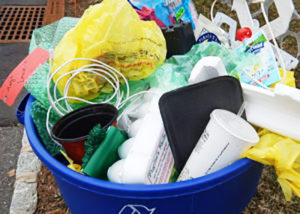
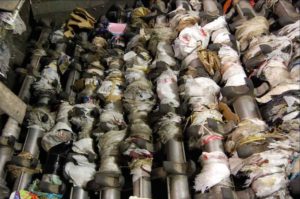
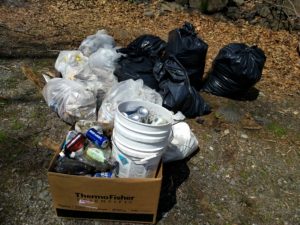
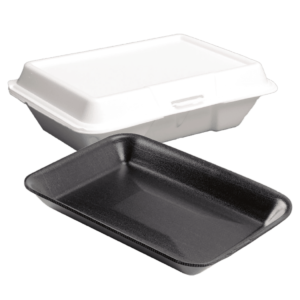
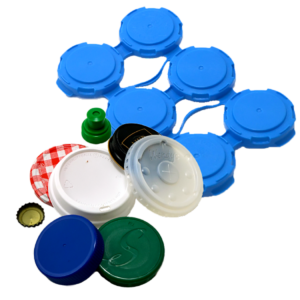

Sorry, the comment form is closed at this time.